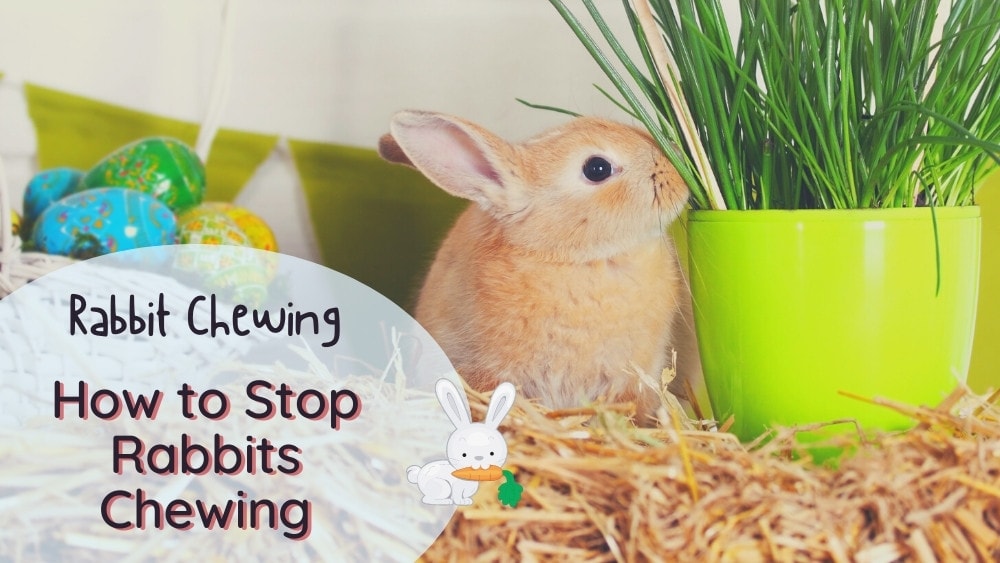Rabbits love to chew! You might find your bunny is gnawing at your furniture, destroying its hutch, and nibbling at anything it can get its cute little mouth on! This behavior can be incredibly frustrating and even dangerous for your rabbit. But don’t panic – you can fix it!
This article will guide you through how to stop rabbits chewing up your home. We’ll also explain why it’s essential for bunnies to be able to chew safely. You and your furry friend can live together in harmony with some simple steps.
How to Stop Bunnies Chewing
Chewing is a natural behavior for rabbits, so you can’t stop it completely. You can stop destructive chewing by providing safe ways for your rabbit to chew. Using deterrents, doing training, and bunny-proofing your home can help to protect your belongings and your rabbit.
The Basics
Why Does My Rabbit Chew Everything?
Wild rabbits munch on various plants and grasses to keep their teeth healthy and their digestive system functioning correctly. Pet bunnies chew for the same reasons.
Unlike humans, rabbits’ teeth constantly grow throughout their lives. Their teeth grow around 1 cm every month! Rabbits constantly chew to wear their teeth down and maintain their dental health.
Overgrown teeth can lead to serious dental issues in bunnies, so chewing is vital to their survival.
Chewing can also be fun for your rabbit – it feels good, and it’s entertaining. If you don’t give your bunny anything to chew on, it will find other alternatives. Often this will be your furniture, carpet, baseboards, or other belongings!
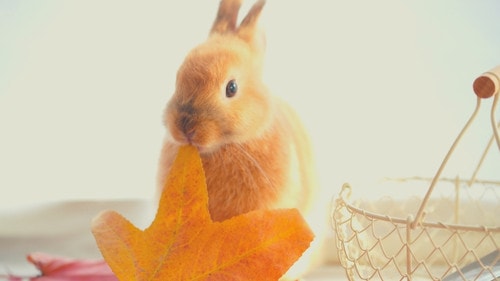
What Does it Mean When a Rabbit is Chewing?
If your rabbit chews destructively, it might mean it’s bored or under-stimulated. It might also be trying to get your attention, especially if your rabbit feels lonely.
Why Is My Rabbit Chewing Its Hutch?
If your bunny chews its hutch or the bars of its cage, it’s likely because your bunny is bored.
Rabbits need ample space in their enclosure and lots of time out of their hutch to play and exercise. Without this, they can get frustrated and may chew to try and entertain themselves. Imagine being stuck in a small room for days with nothing to do – I know I’d get annoyed too!
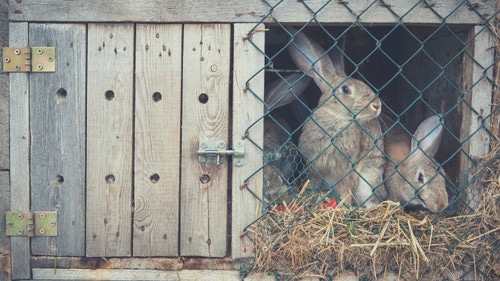
Your bunny might chew its hutch if it doesn’t have an appropriate diet or toys to safely chew. It might also chew its hutch if it lives alone. Rabbits are very social animals and can become unhappy without another bunny to live with.
Do Rabbits Stop Chewing as They Get Older?
Just like human children, young rabbits are still exploring the world. They’re figuring out what they’re allowed to do and testing out their surroundings. Young bunnies are also very energetic and mischievous!
As your rabbit gets older, it will likely settle down. Bunnies will always need to chew, but older rabbits are less likely to chew destructively.
As my lovely rabbit aged, he became less energetic and stopped chewing stuff as much as he did when he was younger.
Is My Bunny Teething?
Rabbits don’t go through the teething process in the way that human babies do. However, they are born with a set of ‘baby teeth’. They will usually have their adult teeth by the time they’re 35 days old. So, it’s safe to say your bunny isn’t chewing because it’s teething.
Do Rabbits Chew Furniture?
If rabbits are bored or don’t have enough to chew on, they will happily chew on your furniture. They will basically chew on anything they can reach! It’s important to address inappropriate bunny chewing as soon as possible for your pet’s safety.
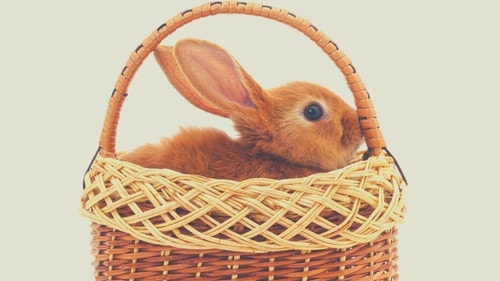
Why is My Bunny Biting?
If your rabbit is biting you, it can be upsetting. Thankfully, it doesn’t mean your bunny hates you. Your rabbit might be trying to communicate with you or expressing frustration. They might even be giving you affection by nibbling you! Check out our guide on why rabbits bite to learn more.
How to Get Your Rabbit to Stop Chewing Everything
Your bunny chewing everything around your home isn’t just frustrating for you. It can also cause health issues for your rabbit. Your rabbit could ingest something toxic or eat something that’s going to cause a blockage. These issues can escalate quickly and be dangerous for your furry friend. Thankfully, there are plenty of steps you can take to resolve the problem.
1. Provide Chewing Alternatives
To fulfill your bunny’s instincts, provide it with plenty of safe things to chew. If you notice your rabbit chewing on something inappropriate, you can redirect it by giving it one of the safe items so it can fulfill that urge.
What Can I Give My Bunny to Chew On?
You should always give your rabbit plenty of hay. Hay is one of the best things for your pet to chew. If you find that your rabbit is not particularly interested in its hay, try spicing it up!
While Timothy Hay is usually best for your bunny, there are other options. You can try different rabbit-safe varieties of hay or hay toppers (treats to mix in with their hay). Experiment to figure out what your rabbit likes.
You can also try different ways of providing their hay! Scatter it, try a different hay feeder, hide it in their hut, or even stuff it in an empty toilet roll to make it more exciting.
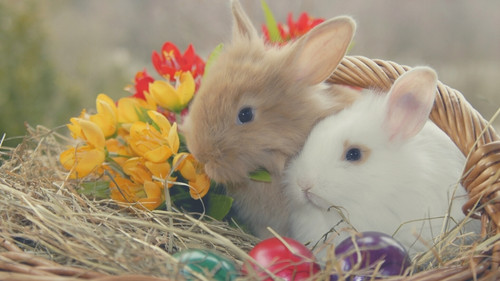
When we first got my bunny, he had been badly treated and didn’t really know how to eat hay (I know that sounds funny, but it’s true). It took a lot of encouragement to get him munching away. After some experimenting, we found out he loved hay toppers like dandelions. He always enjoyed this brand of Boredom Breaker Dandelion Treats. He also liked it when we hid treats in his hay so he could forage for them.

There are some excellent rabbit chew toys on the market in all shapes and sizes which encourage natural behaviors. There are balls made from natural materials, edible bowls, grass mats, hanging toys, edible treat puzzles, and even edible toys shaped like carrots! You can also get edible huts and hideaways, which my rabbit found endlessly entertaining.

Even with rabbit-safe chew toys, keeping an eye on your bunny is essential to ensure it isn’t ingesting large amounts of the toy material. It’s fine for rabbits to nibble on toys, and they can swallow small amounts, but eating too much of the chew toy can cause digestive issues.
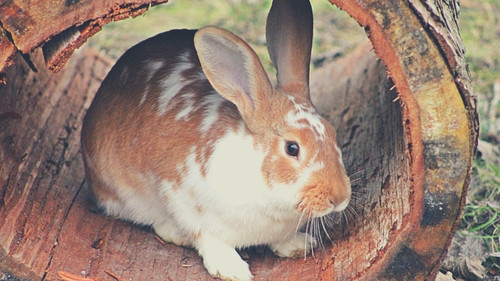
There are plenty of healthy rabbit treats that encourage chewing. I particularly liked hay blocks for my bunny, like these Timothy Blend Cubes. I found they encouraged him to eat more hay and made him feel like he was getting a special treat.

Can I Give My Rabbit a Stick to Chew On?
You shouldn’t give your bunny sticks or twigs you find outdoors, as they can contain mold, parasites, and bacteria. If you want to give your rabbit chew sticks, you can buy some safe ones made specifically for small pets to chew. These Apple Wood Sticks are a great example.

Is It OK for Rabbits to Chew on Cardboard?
It’s generally safe for rabbits to chew on cardboard. It’s a great, cost-effective way to make huts and toys at home! You can use empty cardboard boxes, kitchen rolls, or toilet rolls. Just keep an eye on your rabbit to ensure it’s not eating large amounts of cardboard, and it should be fine.
2. Provide an Enriching Environment
You can prevent your bunny from becoming bored by providing an enriching environment. Make sure your rabbit has a large enclosure with toys, hay, treats, and, ideally, another bunny to live with.
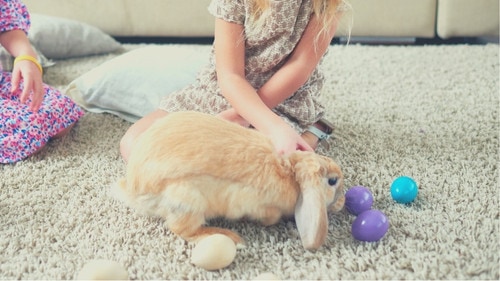
Create games, buy puzzles, and switch out their toys every few days to keep your rabbit stimulated. Give your bunny lots of time out of its enclosure to play and run around.
3. Use Positive Reinforcement and Training
Some people find that a short, firm “no” can help to interrupt their rabbit’s destructive chewing. However, I don’t recommend this personally, as it only works briefly.
You should never shout or punish your rabbit as it won’t understand and could become scared of you.
Instead, you can focus on positive reinforcement to train your rabbit. You should always supervise your bunny when it’s out of its enclosure. If your rabbit starts chewing something it shouldn’t, give it an appropriate chew toy to redirect the behavior.
If your bunny responds and chews the toy, offer plenty of praise and treats. Bunnies understand more than you might think and do well with consistent training.
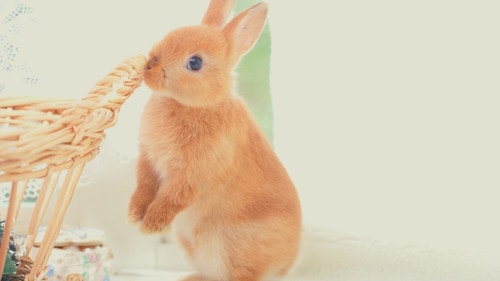
Avoid trying to redirect the destructive chewing by giving treats, though. If you offer treats while your pet is being destructive, your bunny will likely think you’re praising it for chewing your furniture!
4. Spay or Neuter Your Rabbit
Spayed or neutered rabbits are less likely to display destructive behaviors like chewing and digging. Spaying or neutering is good for your rabbit’s health and prevents unwanted pregnancies.
5. Use Bitter Spray
Some owners have had success with using a ‘rabbit repellent spray’, like a bitter apple spray. This sounds harsh, but it’s just a spray you can use on areas of your home where your pet tends to chew. It tastes bad to deter your bunny, but won’t harm it.
To be safe, it’s best to stick to sprays specifically made for rabbits rather than trying to make one at home. The Grannick’s Bitter Apple Spray is a good option.

In my experience, a lot of bunnies will ignore the spray or even just lick it off! A few rabbits I’ve worked with actually liked the taste and would look for more. So, it might not be the most effective solution for every rabbit, but it’s certainly worth a try.
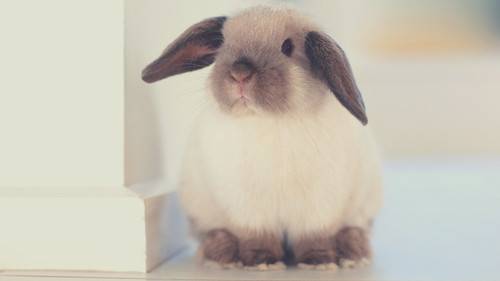
6. Bunny Proof Your Home
When you have a child, you baby-proof your home to keep them safe. The same goes for bunnies! Before you bring your rabbit home, you should rabbit-proof any rooms it will have access to, especially if it’s free-roaming or prone to chewing.
Keep electrical cords and any wires out of your rabbit’s reach. If you can’t move the wires, you can use cord protectors or wire grids to stop your rabbit from getting to them.
You should ensure there’s nothing toxic that your rabbit could get their mouth on, like certain toxic plants or foods.
You can move any precious belongings out of your rabbit’s reach, so it doesn’t have a chance to chew them. I’ve found one of the simplest ways to keep rabbits safe is to use pet pens or child gates to block access to areas of the house where they could get themselves into trouble. It’s an easy solution and tends to be more cost-effective than other options.
While you’re training, you could cover wooden furniture legs with PVC tubes. You can protect your baseboards with wood panels, plastic guards, and corner guards. You can always visit your local DIY store and get creative!
Conclusion
Chewing is a natural and necessary behavior for rabbits. With some simple steps, you can stop your rabbit from chewing inappropriately and, instead, let it chew away safely!
Did you find this article helpful? Do you have any experiences of rabbits chewing you’d like to share? We’d love to hear your thoughts in the comments!


